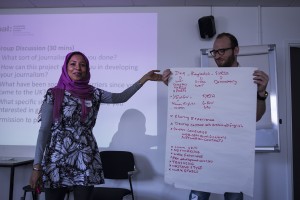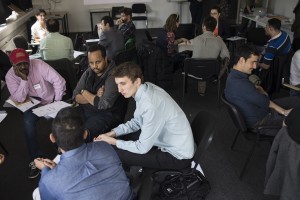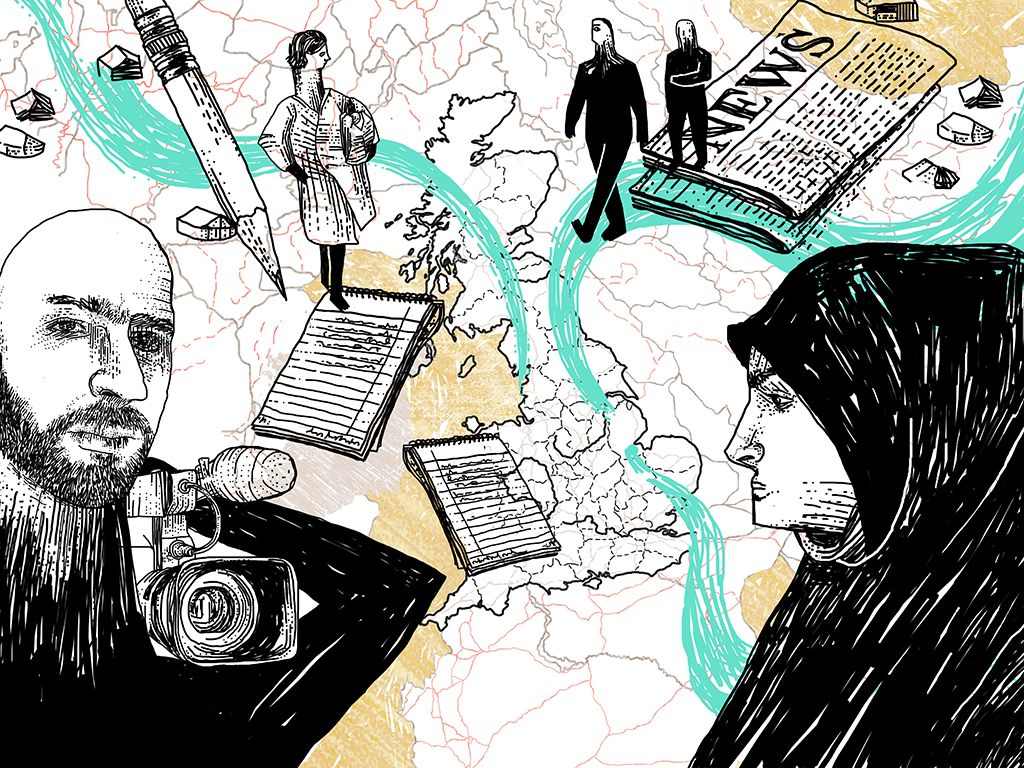The idea for this project emerged a couple of years ago while I was doing some voluntary media work at the Migrants Resource Centre. We were coming across experienced workers who were having difficulty re-establishing their careers in the UK.
One-off media projects provide some support, but we wanted to go further by devising something that could have a more lasting impact. So, in a partnership between the London College of Communication and the Migrants Resource Centre, we developed The Refugee Journalism Project. Through mentoring, journalism workshops and internships, we seek to support refugee and exiled journalists to build up their network of industry contacts; update their skills; and help get their voices into the mainstream media.
We’ve recruited participants from Syria, Sudan, Eritrea, Afghanistan, Iraq, Iran, Cuba, Pakistan, Bangladesh and the Yemen. All have successfully been through the asylum process and have confirmed refugee status. We originally aimed to work with 20 participants, but we have more than 30. Each month we are approached by more migrants hoping to join.
One of the central features of the project is the pairing of the refugees with established journalists and media professionals. The lack of access to a network has been frequently cited as a barrier to their progress. Our mentors have worked for BBC, CNN, Vice, Channel 4 News, The Telegraph, New Statesman, Sky News, The Times, The Economist and Vanity Fair. The mentors tailor their guidance according to the mentees needs – some are working on pitches to take to commissioning editors for radio documentaries, investigations or feature articles, others are spending the time developing their CVs, or career planning.

Each month we run journalism workshops on a range of topics. We kicked off in April with a lively session led by Dr Abel Ugba from the University of East London exploring the concept of universal values in journalism. Later that month, journalist Neil Arun delivered some sessions around pitching and developing ideas. The group vented their frustration at the dehumanisation of the refugee story and the need to change the stereotypical narrative of migrants jumping off boats and trucks. Over the summer we held other sessions in UK media law and personal publishing platforms. Next month, Juliet Ferguson and Jenna Cordroy from the Centre for Investigative Journalism will deliver workshops on investigative skills and data journalism. There’s also a trip to the Guardian to meet journalist Gary Younge.
Two of our participants are currently interning at Airwars – a group that monitors civilian deaths from drone strikes. They’ve been invited to apply for a paid researcher post within the organization. Over the next few weeks we aim to build on this by finding internships with media organisations for more of our group.
A handful of journalism undergraduate students at LCC have also volunteered to work alongside the refugee journalists – supporting the project website and filming activities. This enables the students to gain a more transcultural awareness of journalism, and helps them to develop their interpersonal skills.

There are a number of layers to our expectations for the project. From a journalistic perspective, we hope to help change the narrative around refugees and migrants – too often they are cast as terrorists, parasites or victims. For those who are “work ready”, we want them to be able to successfully compete for paid work. But the project is not just about finding them work and developing their journalism skills. For some, there are more fundamental barriers that need to be tackled. The trauma of the last few years has left some in need of emotional healing. Others have complex challenges around housing to work through. So the project is also about building offering practical support, rebuilding confidence and reducing feelings of isolation. Ultimately, it’s also about supporting their broader integration into the UK. We want to help them thrive and resettle their lives in their new communities.
The Esmée Fairbairn Foundation has funded us for one year. As a core team of two, we have to be realistic about what we can achieve in that time. We’ve had some really positive feedback, and organisations like the UN’s refugee agency, the Frontline Club and the Refugee Council have given us words of encouragement. Longer term, we wish to continue and grow the project by attracting more funding and partnerships. We also hope our work can contribute to the wider policy discussions around migration.
The refugee crisis is not disappearing anytime soon, so it’s important that we think about how these new arrivals rebuild their lives. Many of them have important contributions to make to the UK, but just need a little bit of support to achieve them.
